- Home
- James A. Michener
Sayonara: A Novel Page 2
Sayonara: A Novel Read online
Page 2
I had always been careful never to discuss military secrets with anyone and I said, “I’d rather not hear about it.”
Kelly threw me a nasty salute and said, “This ain’t Air Force secret. It’s Ace Gruver secret.”
“What do you mean?”
“Why do you suppose you’re gettin’ orders to Kobe? And a cushy job? And a priority flight?”
I sensed that I was getting in too deep with Kelly and changed the subject. “Chaplain tells me you’re heading for Kobe, too.”
“Yep.”
“I hear your Congressman arranged it.”
“Yep. Chaplain said no. Colonel said no. You said no. But the Congressman said yes.”
I let him know by my manner that I was disgusted with such procedures and asked with some irony, “And I hear you’re getting married.”
“Yep.”
His insolence killed any intention I might have had to help Chaplain Feeney by arguing with this low-grade character. I signed the receipt for my orders and headed for the door. But Kelly stopped me short by saying, “I hear you’re gettin’ married too.”
“What do you mean?” I asked.
“The general’s daughter is arrivin’ in Kobe. Tomorrow.”
Kelly stared up at me with a nasty grin and when I asked if this was true he said, “Yep. General Webster arranges it so you can marry his daughter. My Congressman arranges it for me. Generals for the officers. Congressman for the peasants.”
Kelly and I looked at each other in one of those odd moments when you seem to see life in absolutely clear cold light. You see another human being without uniform, without degrees, without past or future. There he is, with his own problems and ambitions that are miles apart from yours but which at the same time are part of yours. The Secretary of War once told me that my father’s great success in the Army sprang from his ability to see each man he had to work with dangling in free space, suspended by a string leading to the hand of God. I could respect Kelly. He was trying to get my goat and he was an evil little twerp, but I could respect him.
I took out my wallet and asked, “Have I ever shown you a picture of the general’s daughter?” I think Kelly must have been looking at me in that same cold clear light for he leaned forward like a human being and said no.
But I got mixed up—I’d never before bagged two MIGs in one day—and the picture I grabbed was not my prize shot but one of Eileen and her mother. Kelly studied the picture and asked, “Is the battle-axe your mother-in-law?”
I recovered the picture and said, “This is the one I meant to show you.”
Kelly whistled and said, “Wow! She sure fills a bathing suit.”
I said, “She intended to.”
Kelly said, “She’s a dish. Even for a general’s daughter, she’s a dish.”
I said, “It’s pretty exciting to think of a girl like that waiting for you in Kobe. Thanks for the good news, Kelly.”
He said, “You ever seen Katsumi?”
“Where’s Katsumi?” I asked.
“The girl I’m marryin’.”
“I’m sorry. I don’t know Japanese names.”
“Think nothin’ of it,” he said brashly.
He produced a small P.X. picture of his girl. I was embarrassed because this Katsumi was certainly no Madame Butterfly. She had a big round face, prominent cheeks and what looked like oil-black hair. If you’d never been in Japan you’d probably have taken her for an Indian or an Eskimo maybe. But if you’ve ever seen Tokyo you’d recognize Katsumi at once. She was one of the millions of girls who could never be pretty, who did all the heavy work and who dressed as if the only clothes in Japan were made from old flour sacks.
I had to say something and by the grace of God I remembered about her working in a library. I said, “She sure looks intelligent.”
Kelly said, “She’s a lot brighter than me.”
I was about to leave when I recalled my promise to the padre. I asked, “Aren’t you taking a big risk?”
“Risks don’t scare me any more,” Kelly said defiantly.
“I mean about not being able to take her home?”
“That’s what don’t scare me,” he said.
“How old are you, Kelly?”
“Nineteen.”
“You’re only a kid. Why don’t you think this over?”
“I have. The Army and the Air Force and the State Department have ganged up to keep me from gettin’ married. Only makes me more determined.”
“What do you mean, ganged up?” I don’t like people who feel sorry for themselves.
“When my Kobe skipper saw I was really gettin’ serious about Katsumi he gave me the bum’s rush to Korea. Then the doubledomes in Washington set a deadline. ‘If you marry a Jap girl after then,’ they said, ‘we won’t let you bring her back Stateside.’ So I drew a court-martial for demandin’ that I be sent back to Japan to marry the girl before the new law. I never made it. And now each week Father Feeney hands me a pamphlet provin’ how stupid I am even to be thinkin’ about such a thing.”
He ripped open a drawer and slammed down some mimeographed sheets widely used in our area to bring young kids to their senses. The one on top was titled, “But Will Your Family Accept Her?” Kelly grabbed it in his hairy hand, crumpled it up and pitched it into the basket.
“They’ve tried everything to stop us, but do you know what I’m gonna do, Ace?”
“Something stupid, I’m sure.”
“That’s right. I’m stupid enough to be in love. It happens that I love this girl. And if I have to give up my American citizenship to marry her, that’s O.K. with me.” He was trembling mad and put his girl’s picture back in bis desk.
I was outraged to think that any American man would dare to talk like that. Give up his citizenship! I wanted to grab the young idiot and knock some sense into him, tell him that anyone who even thought of surrendering his American citizenship for a Japanese girl ought … He turned his back on me and started on some paper work, as if to dismiss me.
I don’t take that from anyone. I got sore. I reached out, grabbed him by the shirt and spun him around. “Who in hell do you think you are?” I cried.
To my amazement he cocked his fist and threatened me. “I’ll let you have it, Ace.”
For one brief moment I wanted to mix with this squirt and pin his ears back, but I realized that would be murder. I could have massacred him any day in the week. So I dropped my hand and said, pretty well shaken up, “You get to be a hophead with these damn jet planes.”
Kelly was completely at ease. He laughed and said, “We could use some more men like you.”
I said, “Excuse me, Joe. But you sounded crazy when you said you’d give up your citizenship—for a girl.”
“I am crazy,” he said. “I’m in love—crazy.”
I felt a little dizzy and said, “Let’s go over to my bunk and split a beer.”
“Wonderful!” he cried, slamming his desk shut. As we walked through the late afternoon sunshine with the hint of spring warmth about us he said, “You know, Ace, back there I wasn’t afraid to sock you. Because I know that if I did you’d knock my block off fair and square and you wouldn’t yell for a cheap court-martial.”
“Oh, brother! How wrong can you be? I just finished arguing with the chaplain that you ought to be court-martialed for having written to your Congressman.”
“I mean, you wouldn’t turn me in over a personal grudge.”
I thought a minute and said, “I guess you’re right.”
“That’s what I mean,” he said.
We went into my bunk and promoted a fifth of Suntory. I said to Joe, “The Japs must make this out of farmers’ socks.” But Joe took a murderous gulp and cried approvingly, “Wow, that’s man’s stuff.”
It was obvious that he wanted to talk with someone. He asked, “You really do think I’m nuts, don’t you? The guys at the mess hall do too. That is …” He paused, looked at me carefully and said, “That is, some of them do. B
ut you know a strange thing, Ace? In the bunks at night you never hear one man who married a Japanese wife complain. You hear a lot of other guys complain about their women. But not the ones who got hitched in Japan.”
This seemed so unlikely that I took a long pull at the bottle and asked, “How come?”
“Sounds old-fashioned, Ace, but it must be love. If a white man with good Air Force pay goes ahead and marries a yellow girl, it must be love.”
“That’s ridiculous!” I felt the old yearning coming back to knock some sense into this kid but he was dragging on the bottle again, so I said, “I’m in love. Half the men around here I know love some girl back in the States. What’s so special about loving a Japanese girl?”
He said, “You ever been in the bunks at night? Men with wives back in the States talk about Junior’s braces and country-club dances and what kind of car their wife bought. But the men with Japanese wives tell you one thing only. What wonderful wives they have. They’re in love. It’s that simple.”
This flustered me because he might have been talking about my own family. My father was a four-star general with a tremendous reputation as a result of what he accomplished in Guadalcanal and the Philippines, and my mother had written a couple of stories that had appeared in the Atlantic Monthly. They were excellent people, they were exciting people, but they had never been in love. In his bunk at night I think my father must have talked about my braces and the kind of car my mother drove. I’m sure he never talked about love.
I said, “There’s a better explanation. The guys with Japanese wives are younger. They don’t have kids to talk about.”
Joe thought that one over, took another swig, and said, “You could be right, Ace. But I ain’t takin’ no chance. Because when I see Katsumi I see a dame who could fill my heart for the rest of my life.” He looked down the tent as if pondering his next comment, then went ahead and made it. “Tell me, Ace, do you feel that way about your girl?”
He had me again because I was a professional soldier. My future was all cut out and I knew that I would never find any one girl whose presence filled my heart forever and ever. Among the young officers in my gang love wasn’t like that. You looked the field over and found a good-looking solid citizen who could stomach you for the rest of your life and if she came from a military family, like Eileen, so much the better. I couldn’t explain to Kelly that Eileen would be the finest wife an Air Force officer could have and yet not be the way he was describing.
I said, “You come see me in ten years and you’ll see a happy citizen!”
Joe took a final slug and cried, “I believe you, Ace. Boy, Ace, you’re one in a million. Ace, you’re one officer in a million I could talk to.” He shook my hand clumsily and banged his way out into the dusty company street. Then he looked back and cried, “Boy, Ace! We got it made! We’re gonna get married!” and he staggered off to the mess hall.
MRS. WEBSTER: “I don’t mean the Japanese are inferior, but I do mean we ought to remember who won the war.”
On Monday Pvt. Kelly and I flew over to Japan on the same plane and as I watched him strap himself into his bucket seat with real joy at the idea of getting home to his girl I thought how different our two journeys were. He was heading for dumpy, round Katsumi and a future that no one could guess, while I was heading for the big surprise that General Webster had arranged for me: a safe desk job, marriage to his beautiful daughter Eileen, and before too many years a promotion surely to colonel and maybe to general.
I didn’t talk with Kelly on the trip over because there were some colonels aboard and it seemed wiser for me to sit up front with them and exchange ideas about the Russian pilots we were meeting over Korea. But when we reached Japan the medics came aboard to disinfect the plane, and while I was standing in the aisle Kelly whispered, “Ace, you’re the only friend I know here, and you bein’ with the squadron …” I thought he was going to touch me for some cash and I prepared to hand him a fin, but he said, “I was wonderin’ if you’d be my best man. Saturday?”
The colonels started moving out and I couldn’t stand there arguing. My whole inclination—everything I had ever been taught, all I had experienced—led me to say no, but I blurted out, “O.K.”
“Thanks,” he said, and as he trudged across the field, bow-legged and with a gangster slouch, I thought that this square-headed, sandy-haired kid was not the kind you read about in books when they describe the great lovers. Somehow you didn’t think of Pvt. Joe Kelly fighting through walls of flame to win the princess. You thought of him as the tough kid at the filling station who whistles through his teeth at bobby soxers going past in jalopies. But he was off to marry an Asiatic girl in a strange land and I had to admit that he had guts.
I was watching him when General Webster called my name and when I looked his way there stood Mrs. Webster, too. I shouted, “Surprise! When did you get here?”
Mrs. Webster was a handsome woman—the kind who appear in ads wearing tailored suits and white hair and telling the young bride why one cleaner is better than the other—and it was widely understood in Army circles that Mark Webster owed most of his success to this brilliant and energetic woman. I once heard my father say, when some of his classmates from ’22 were visiting, “Mark Webster at the Point was an inevitable colonel. Absolutely impossible for him to go further. But a first-class wife came along and made him a general.” There was no scorn in his voice when he said this—and no envy.
When Mrs. Webster saw me she hurried forward to kiss me on the cheek. I had to make believe I didn’t know where Eileen was so I asked, “What’s the news from Eileen?”
The conspirators looked at each other archly. “She’s still at work in the oil company,” Mrs. Webster said. “But she finds Tulsa dull without you around.”
“Boy, did I find Korea dull without her!”
General Webster said, “I hope you didn’t mind my dragging you away from the Russians.”
“Frankly, sir, I approved. I was getting a bit jittery.”
“Well, we’ll drive you in to Kobe and let you see what the setup is. You’re on the Interservice Aviation Board, you know, but you don’t start work for a week.”
“I’ll get some sleep,” I said, and the Websters snickered to themselves.
He led me to a black Cadillac with one bright red star on the license plate. He had always been something of a dandy, ten pounds underweight, extra-sharp uniforms and a smart headquarters company to make him look good. He was what enlisted men call chicken because he demanded all the military courtesies, straight caps, shined shoes. He himself moved with an exaggerated stride and cultivated a straight-from-the-heart look. Having known my own father well and having discovered in him a real general who cut right through the nonsense to the hard core of every problem, leaving glossy shoes and snappy salutes to others, I often suspected that Mark Webster was merely playing at being a general. Once I remarked on this to my father, who grew very angry. He said, “Look, Know-it-all! The Army needs many different kinds of generals. Mark Webster can do a dozen things I can’t do.” Then he scowled and said, “Not that I would want to do them. But don’t underestimate the men who keep the organization running.” About three days later we were dining in a restaurant that featured a lot of swank and father said, “I always admire headwaiters who appear unflustered yet keep the organization running.” I put my hand over my mouth and mumbled, “That’s what you said the other day about General Webster.” He looked up sharply, considered for a moment and said, “I guess that’s what I meant—if I said it.”
But on this ride in from the airport General Webster was way off stride. He wasn’t his urbane self at all. In fact, he was downright uncomfortable, but it wasn’t until we neared the center of Kobe that I found out what was eating him. Mrs. Webster was riding herd again.
We were passing a corner at which half a dozen enlisted men—we had orders not to call them G.I.’s any more—were loafing. They were in Kobe for Rest and Recuperation from the front in
Korea. Like most soldiers, they were recuperating with streetwalkers. Five chunky Japanese girls were standing with them and as we drove by, one of the soldiers slapped a girl on the bottom. She squealed.
“That’s what I mean,” Mrs. Webster said.
“Kobe’s a recreation center,” the general said grimly. “I can’t change it.”
“It’s disgraceful.”
“I know it is,” the general snorted.
“Furthermore, it degrades the military uniform.”
“There seem to be no rules against it,” General Webster mumbled, leaning back in a disgruntled slouch.
Mrs. Webster, seeing she could get no further with the general, asked me, “What do you think about it, Lloyd?”
“Don’t try to make me argue against a general,” I pleaded.
General Webster sat up. “Seriously, Gruver, what do you younger officers think?”
I had just started to say, “I’ve never understood how any self-respecting officer can go with a Japanese girl” when I stopped sharp. For straight ahead of our Cadillac was a tall Marine lieutenant coming out of a nylon-underwear shop accompanied by the first beautiful Japanese girl I had ever seen. She was slim and black haired and her eyes didn’t slant. And she laughed. Somehow I had never thought of Japanese girls as laughing. But this extraordinarily beautiful girl laughed and tucked her parcel of nylon underwear beneath her left arm. Then, like any American wife at a busy corner, she grasped her Marine’s hand warmly and smiled up at him.
“It’s a disgrace,” the general snorted.
Mrs. Webster leaned forward to watch the Marine and his girl. “Why, he’s a handsome young man,” she gasped. “Probably from a very good family. What’s he doing with a Japanese girl?”
I had a smart-aleck reply to that question but stifled it and then caught the general’s eye and saw clearly that he had thought of the same reply and had killed his, too, for the same reason that I had killed mine. Mrs. Webster looked at us and asked, “Is it true, Mark, that some of our young men have actually married such girls?”
“About 10,000 of them,” he replied gruffly.

 Mexico
Mexico The World Is My Home: A Memoir
The World Is My Home: A Memoir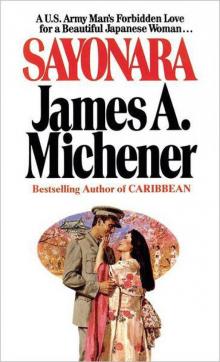 Sayonara
Sayonara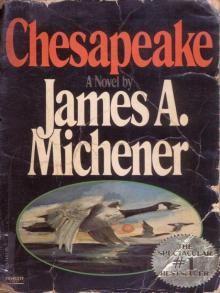 Chesapeake
Chesapeake The Novel
The Novel Rascals in Paradise
Rascals in Paradise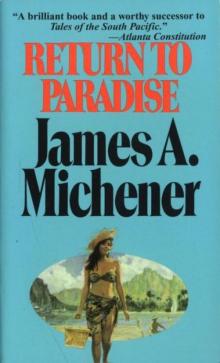 Return to Paradise
Return to Paradise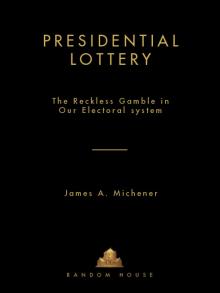 Presidential Lottery: The Reckless Gamble in Our Electoral System
Presidential Lottery: The Reckless Gamble in Our Electoral System The Source
The Source Poland
Poland Space
Space Caravans
Caravans Creatures of the Kingdom: Stories of Animals and Nature
Creatures of the Kingdom: Stories of Animals and Nature Iberia
Iberia Hawaii
Hawaii The Watermen: Selections From Chesapeake
The Watermen: Selections From Chesapeake Report of the County Chairman
Report of the County Chairman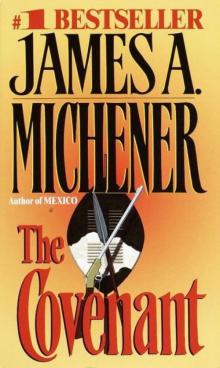 The Covenant
The Covenant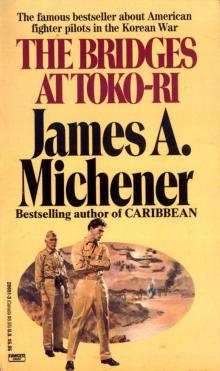 The Bridges at Toko-ri
The Bridges at Toko-ri Matecumbe
Matecumbe Journey: A Novel
Journey: A Novel Centennial
Centennial Sports in America
Sports in America Texas
Texas Miracle in Seville
Miracle in Seville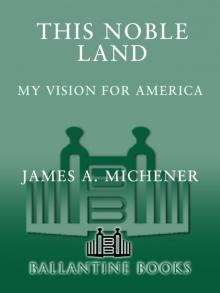 This Noble Land: My Vision for America
This Noble Land: My Vision for America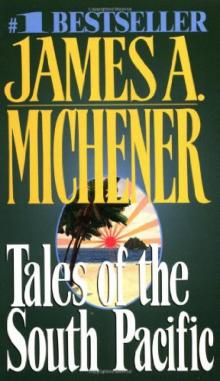 Tales of the South Pacific
Tales of the South Pacific Bridges at Toko-Ri
Bridges at Toko-Ri Space: A Novel
Space: A Novel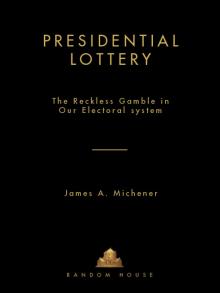 Presidential Lottery
Presidential Lottery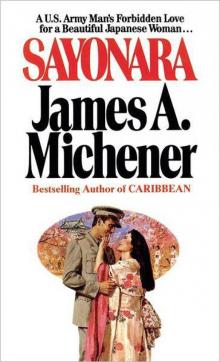 Sayonara: A Novel
Sayonara: A Novel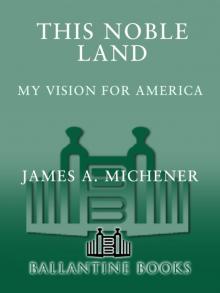 This Noble Land
This Noble Land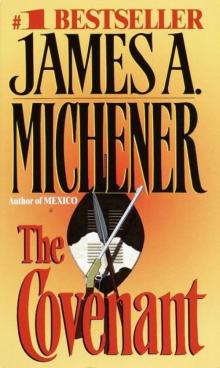 The Covenant: A Novel
The Covenant: A Novel Miracle in Seville: A Novel
Miracle in Seville: A Novel The Bridge at Andau
The Bridge at Andau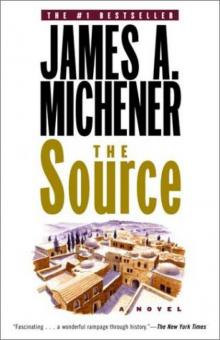 Source
Source The Source: A Novel
The Source: A Novel Journey
Journey Recessional: A Novel
Recessional: A Novel Legacy: A Novel
Legacy: A Novel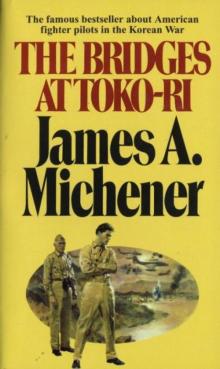 The Bridges at Toko-Ri: A Novel
The Bridges at Toko-Ri: A Novel Poland: A Novel
Poland: A Novel